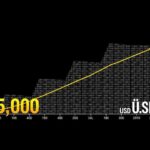Concerns Over Cryptocurrency Outflows’ Impact on Brazil’s Exchange Rates
Economic analysts have raised alarms regarding the potential effects of rising cryptocurrency outflows on Brazil’s exchange rates, with claims that $14.7 billion has exited the country thus far in 2023. While current statistics suggest manageable levels, experts warn of possible destabilization if trends continue. Accepting cryptocurrencies for payments is gaining traction, particularly through stablecoins, amidst debates on the implications for legitimate economic activities versus illegal transactions.
Experts have expressed concerns regarding the potential impact of increasing cryptocurrency outflows on exchange rates in Brazil. As highlighted by data from the Central Bank of Brazil, approximately $14.7 billion has left the country from January to August due to cryptocurrency and related recreational services, suggesting that virtual assets are becoming widely used for payments within Brazil. Economic analysts caution that while current outflow levels are manageable, a sustained increase could disrupt domestic currency stability. The substantial outflows linked to cryptocurrencies, although presently offset by other financial movements, could exacerbate Brazil’s current account deficit, particularly in light of an expanding economy and heightened import activity. Luis Afonso Fernandes Lima, the head of research at Mapfre Investimentos, remarked, “The picture is still pretty, but we definitely have a problem.” The erratic nature of cryptocurrency transactions poses additional challenges, as they are difficult to forecast. There is a growing belief among analysts that the rising use of cryptocurrencies as payment options among Brazilians, especially with the increasing popularity of stablecoins in the market, is a significant contributing factor to these outflows. Additionally, it has been suggested that some businesses based overseas may also be engaged in cryptocurrency transactions, given the high figures reported. Pedro Guimaraes, a product leader at Ouribank, noted, “The amount of cryptocurrency expenses in the capital account is too high for it to be just investors speculating or dollarizing with stablecoins.” Conversely, not all economists view these outflows as detrimental. Lívio Ribeiro, a partner at BRCG, contends that such financial movements may only pose a risk when linked to illegal activities, thus mitigating concerns for other legitimate transactions. To keep abreast of ongoing developments in the cryptocurrency sector and economic conditions in Latin America, individuals are encouraged to subscribe to the Latam Insights newsletter.
The article addresses the growing concern among economists and analysts in Brazil about the implications of increased cryptocurrency outflows on the domestic exchange rate. The Central Bank of Brazil has reported significant outflows associated with cryptocurrency activity and recreational services since the beginning of the year. This trend raises alarms about potential destabilization of the Brazilian economy as adoption of digital currencies becomes more prevalent among the population. The rise in such financial transactions is indicative of a broader acceptance of cryptocurrencies as viable payment solutions, which some experts believe could have both positive and negative repercussions depending on their regulation and usage.
In summary, while the increase in cryptocurrency outflows in Brazil presents notable challenges for domestic exchange stability, it also reflects a shift towards greater acceptance of digital assets as payment methods. The extent of these outflows necessitates careful monitoring, as unchecked growth could lead to adverse economic consequences. However, opinions vary regarding the actual risks involved, with some experts asserting that only illegal activities could render these financial shifts problematic.
Original Source: news.bitcoin.com







Post Comment